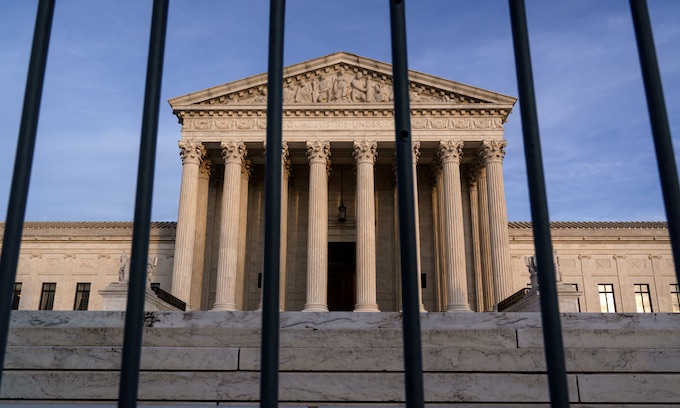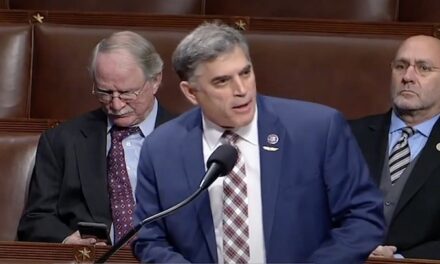Three cases brought by Pennsylvania Republican leaders challenging different aspects of last year’s presidential election here have been turned aside by the Supreme Court of the United States.
Three justices signed on to dissenting opinions on the two of the cases, however, meaning the vote to hear the cases fell short by just one vote.
None of the cases involved in Monday’s orders contained specific allegations — let alone evidence — of votes being deliberately cast illegally. Instead they took issue with Pennsylvania’s processes for the casting and counting of ballots from legally registered voters.
GOPUSA Editor’s Note: Please keep in mind that this is a mainstream media story which may contain politically biased language. The source of the story is in the dateline. We publish it for the purpose of informing our readers. What is GOPUSA? Read our About Us page to find out.
The court’s decisions to set the cases aside means, for now, any clean-up of Pennsylvania election law sits squarely in the hands of the Republican-dominated legislature and Democratic Gov. Tom Wolf, and whether or not they can come to an agreement.
In orders handed down Monday, the court’s majority said that it would not hear separate appeals by the Republican Party of Pennsylvania, leaders of the Republican majority caucuses in the state House and Senate, or a third case where the lead plaintiff was U.S. Rep. MIke Kelly, a Republican congressman from Butler County.
The plaintiffs in the first two cases had wanted the court to take up the question of whether the Pennsylvania Supreme Court had overstepped its legal authority in issuing orders this fall that extended the period for receipt of mail-in ballots till Nov. 6, 2020, or three days after Election Day.
The GOP plaintiffs in both cases said that special, one-time extension of the ballot receipt date violated constitutional clauses that reserve all power for setting the time, place and manner of elections to the legislature, and also violated federal statutes setting a uniform nationwide federal election day.
The court also refused to the case brought by Kelly and a small group of Republican voters that alleged the creation of Pennsylvania’s no-excuse, mail-in balloting system in 2019 – a system that Democrats used effectively to drive new voters to the polls last year – was enacted in violation of the state Constitution.
Kelly and his fellow plaintiffs noted that the legislature had started a process to expand voting-by-mail through the constitutional amendment process in the 2019-20 legislative session – which they argued is the only legally permissible way to do it – before it was enacted as part of a broader election reform statute in October of 2019.
President Joe Biden won Pennsylvania’s presidential vote over Republican incumbent Donald J. Trump by a margin of more than 80,000 votes, netting 50.01 percent of all votes cast.
That result has been certified, executed and is in the books with prior courts having ruled that the challenge brought by Kelly – brought after the votes were cast and counted – improperly asked the court to change the rules after that contest had played out, disenfranchising millions.
Attorneys in all of the cases have since conceded that the issues they raise will now affect Pennsylvania’s elections going forward, In the event that the court decides to consider any of the cases after that, it would likely only do so in terms of their implications for future elections.
That argument rung throughout the dissents filed by Justices Clarence Thomas, Samuel Alito and Neil Gorsuch, with Thomas writing in part:
“That decision (by state officials and the courts) to rewrite the rules seems to have affected too few ballots to change the outcome of any federal election. But that may not be the case in the future. These cases provide us with an ideal opportunity to address just what authority non-legislative officials have to set election rules, and to do so well before the next election cycle.
“The refusal to do so is inexplicable,” Thomas added, noting that federal circuit courts of appeal have now ruled differently on such ballot receipt extensions in different parts of the country.
Thomas also wrote that, as a practical matter, it is too difficult for the court to take up complex election law cases in the heat of a hotly-contested campaign, and it should be done now.
“One wonders what this Court waits for,” Thomas concluded.
“We failed to settle this dispute before the election, and thus provide clear rules. Now we again fail to provide clear rules for future elections. The decision to leave election law hidden beneath a shroud of doubt is baffling. By doing nothing, we invite further confusion and erosion of voter confidence. Our fellow citizens deserve better and expect more of us.”
___
(c)2021 The Patriot-News (Harrisburg, Pa.)
Visit The Patriot-News (Harrisburg, Pa.) at www.pennlive.com
Distributed by Tribune Content Agency, LLC.
—-
This content is published through a licensing agreement with Acquire Media using its NewsEdge technology.



















bull these judges have no spine either and so they are traitors as well!
Well, they did remove all doubt as to whether or not they are CON-CONSPIRATORS to ” DESTROY THE NATION FROM WITHIN.”
Per Nikita Khrushchev…
Which is why i Still feel, TRUMP SCREWED UP fighting to get gorsuch, kavenaugh and barret on the bench, IF THEY ARE GOING TO BE THIS DAMN cowardly..
SCOTUS and the judicial system is worthless and as a result our Constitution has been destroyed. Shame on these idiots.
Well what do you expect from the satan worshipping DEMONcrats, they will say and do anything to get what they want, and what the DEMONcrats want is to finally destroy this country and destroy it they are going to. With quid-pro-joe bringing all the illegals into the country to not just overwhelm the system, but to overwhelm everything this country once stood for. The quid-pro-joe said that America was back but say this America is now lost for all time, the DEMONcrats are sitting things up so that there will not be anymore elections.
These days, i see NOTHING what so ever, with the entire DC aparatus, worth saving.
President Joe Biden won Pennsylvania’s presidential vote over Republican incumbent Donald J. Trump by a margin of more than 80,000 votes, netting 50.01 percent of all votes cast.
And to think he couldn’t get more than a dozen “supporters” to show at a rally. Why, it’s a Democratic Socialist miracle!!
I guess all the blood, sweat and tears devoted to placing Kavanaugh and Barrett on the Court was uncalled for – could have done just as well with Obama or OBiden choices for SCJs. So, the Deep State owns the Court, too??
how long before one resigns to MAKE ROOM FOR OBAMA?
Apparently so.. WHICH MAKES you wonder, why the left fought SO HARD against Barret, Gorsuch and co, IF THEY KNEW THOSE TRAITORS would be this cowardly/??
““One wonders what this Court waits for,” Thomas concluded.“
“one”?
How about 80+ MILLION VOTERS are extreme;y interested…..
The only thing i wonder, is, IS THERE A WAY WE can call to impeach and fire every one of those scum sucking wastes of oxygen???
The senate has the power to impeach a judge but don’t count on it happening.
Especially when the dems effectively control it (what with Harris being the tie breaker).
Too bad you didn’t mention that they brought this to court about a month before the election and it was refused because of standing, i.e.: no one had been injured by the law as of yet. So if you cant fight it before the election and you cant fight it after the election, when can you fight it??????
It sounds like the PA legislature needs to pass a bill that would make statutory punishment mandatory for anyone circumventing election law, with even steeper penalties for elected officials.
You mean like MANDATORY MINIMUM 10 YEARS for the first offense?
PUBLIC HANGING TELEVISED WORLD WIDE for Supreme Court JUST-US’S for throwing away the votes of A MAJORITY OF VOTERS to further THEIR OWN PERSONA AGENDAS?
I good with that.
IT matters not what the law(s) are, IF NO ONE IS GOING TO bloody well enforce them.
I guess there is no need for the Dems to pack the court. It already is.
Hence why i fear ALL THOSE GUN grabbing EO’s and other things, the left wants to do, WILL end our 2nd amendment, CAUSE THESE cowardly spineless traitors, WILL UPHOLD THEM AS ‘ok;.
Address to the SCOTUS:
“We have been assured, Sir, in the Sacred writings that except the Lord build the House, they labor in vain that build it. I firmly believe this. I also believe that without His concurring aid, we shall succeed in the political building no better than the Towers of Babel; we shall be divided by our little partial local interests; our projects will be confounded, and we shall ourselves shall become a reproach and a by word down to future ages. And what is worse, mankind may hereafter from this unfortunate instance, despair of establishing government by human wisdom and leave it to chance, war, or conquest,” – Ben Franklin
The supremes have shown, once again, that they are exactly what teats on a boar are, USELESS! And COWARDS to boot, might as well PACK that court with a couple hundred more IDIOT JUDGES for all the worth of these VERMIN!
Why are these Supremes completely uninterested in election integrity? They fit in a banana republic where elections are stolen and the judiciary rubber stamps them.
AND if they don’t care about election integrity, NOR GUNS (as we’ve seen many a time before), what the hell is the purpose in KEEPING THEM?
To me, there is none.
I just want to thank Clarence Thomas for seeing the true severity of the situation. It’s nice to know we have at least one dedicated American on SCOTUS that has the guts to seek the truth.